Demonstration for the establishment of the Memorial to the Sinti and Roma of Europe Murdered under the National Socialist Regime, November 2003; photo: Documentation and Cultural Centre of German Sinti and Roma.
The European Civil Rights Prize of the Sinti and Roma
The European Civil Rights Prize of the Sinti and Roma was initiated against the backdrop of the extremely grave human rights situation of Sinti and Roma in many European states, particularly in Eastern and South-Eastern Europe. The prize is intended as a contribution to protect and assert the civil rights and equality of opportunity for Sinti and Roma in their respective home countries. In addition, the prize aims to encourage politicians and citizens to stand up for equal treatment of Sinti and Roma and for their inclusion and participation in all areas of public life.
It was awarded for the first time in December 2008 to former Polish Foreign Minister Władysław Bartoszewski. Against the background of his personal experiences of the National Socialist murderous terror, Władysław Bartoszewski devoted himself to the protection of human rights and the struggle against racism after the Second World War. In his writings, in a large number of public addresses and time and again with deeds he advocated from an early date that both Sinti and Roma and the Jews were victims of the systematic policy of extermination. The survivors of the Sinti and Roma and their descendants could count on his support in a great many political conflicts.
Since then the prize is awarded every two years to individuals, groups, or institutions primarily from the majority society who face up to the historical responsibility and have committed themselves in exemplary manner to improving the human rights situation of the Sinti and Roma. Previous prize-winners were former President of the European Parliament Simone Veil, the then Human Rights Commissioner of the Council of Europe Thomas Hammarberg, President of the Society for Threatened Peoples Tilman Zülch, the human rights organisation Amnesty International and Andrej Kiska, former President of the Slovac Republic.

The early days of civil rights work of German Sinti and Roma
Exhibition “The long path to recognition of the Roma and Sinti Holocaust”

First public civil rights campaign against racism
Exhibition “The long path to recognition of the Roma and Sinti Holocaust”

The hunger strike at the former concentration camp in Dachau
Exhibition “The long path to recognition of the Roma and Sinti Holocaust”

The search for the Nazi race files
Exhibition “The long path to recognition of the Roma and Sinti Holocaust”

The recognition of the Nazi genocide of the Sinti and Roma
Exhibition “The long path to recognition of the Roma and Sinti Holocaust”

Protests against special registration by the police
Exhibition “The long path to recognition of the Roma and Sinti Holocaust”

No appropriate compensation for Sinti and Roma persecuted by the Nazi regime
Exhibition “The long path to recognition of the Roma and Sinti Holocaust”

Remembrance in Auschwitz
Exhibition “The long path to recognition of the Roma and Sinti Holocaust”

The world’s first permanent exhibition on the Nazi genocide of the Sinti and Roma
Exhibition “The long path to recognition of the Roma and Sinti Holocaust”

Clemency for the murderers – the Judiciary reviews Nazi crimes
Exhibition “The long path to recognition of the Roma and Sinti Holocaust”










